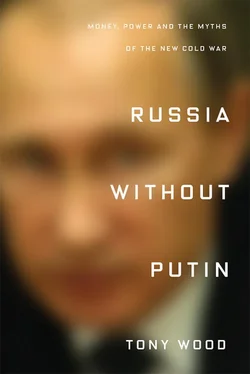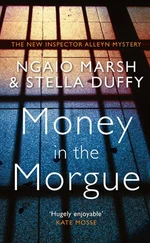Indeed, the Party of Progress platform firmly places it in this neoliberal lineage in the social and economic spheres, with prescriptions drawn from the standard repertoire of the US and European centre-right. Russia’s ills are held to stem from the overweening power and reach of the state, and should be remedied by deregulation, cutbacks in the number of government functionaries, and privatizations to reduce the weight of the state in the economy. The current flat income tax rate should be supplemented with wealth and property taxes, but there should be no shift to progressive taxation, since this would penalize the middle class. Welfare should be targeted and recipients rigorously means-tested, and whatever social guarantees the state provides should not interfere with economic growth and competitiveness. Pensions should be switched to a defined-contribution basis rather than the current defined-benefit system, and the pension age gradually raised. Private–public partnerships should be encouraged in health care, education and infrastructure.
This is, of course, a familiar set of recipes. In some ways, the Party of Progress platform is a digest of the last three decades of conventional Western social and economic policy. The only real surprise here is seeing these ideas being actively recommended almost a decade after they led the world into a pervasive crisis from which no exit is in sight. If put into practice in Russia, they would likely worsen the situation for millions. As the experience of the West has shown, means-tested benefits and ‘targeted’ welfare have functioned as a way of withdrawing social guarantees, pulling the rug out from under a whole swathe of society while subjecting them to onerous and humiliating bureaucratic burdens. Public–private partnerships would saddle the public with colossal debt while pouring revenues into the pockets of private companies. More privatizations would amplify the already tremendous imbalances in wealth and power. And raising the pension age in Russia without first drastically improving health indicators would stretch most people’s working lives beyond their life expectancy.
But the problem is not simply that these ideas have been found wanting elsewhere. More importantly, many of them either extend or intensify free-market prescriptions that have already been tried in Russia as well, and have sparked multiple protest movements both before and after the 2011–12 cycle. Since Putin’s return to office, in fact, the small-scale mobilizations evoked earlier have continued. Starting in 2013 there were protests against reforms imposing austerity – officials called it ‘optimization’ – in the healthcare system, followed in 2014 by protests against cuts to education funding. More surprising were the nationwide actions that began in November 2015 as long-distance truck drivers, dal’noboishchiki , protested against increased freight taxes. These were to be levied through a new electronic payment system called Platon, which happened to be owned by the son of Putin’s friend Arkady Rotenberg – a connection which for many encapsulated the injustice and crookedness of the whole scheme. The system was introduced all the same, but the truckers renewed their protests in 2017 – having formed a new trade union in the meantime. The independent labour movement remains active, though it has come under severe judicial pressure: since 2017 both the truckers’ union and the Inter-Regional Trade Union ‘Workers Association’ (MPRA), led by former Ford unionist Etmanov, have had to battle against an official designation as ‘foreign agents’. Environmental actions, too, continue: in 2017, a group of ‘guerrilla pensioners’ in Karelia managed to block a mining company’s bid to fell a forest. {21} 21 On the healthcare reform protests, see for example ‘Vrachi vzialis’ za lechenie sistemy zdravookhraneniia’, Kommersant , 2 November 2014. On the dal’noboishchiki , see Nikolai Ovchinnikov, ‘A voice from Russia’s truckers’ protest’, openDemocracy , 9 December 2015, and Ekaterina Fomina, ‘We have plenty of reasons to protest apart from Platon’, openDemocracy , 14 December 2017. On Karelian pensioners, see Anna Yarovaya, ‘Extremists by any other name’, openDemocracy , 31 January 2018.
The gap between the policies proposed in the Navalnyi-inspired platform and these wider social realities is only the latest variation on the split that has run through the anti-Putin movement from the outset, and remains unremedied: the disconnection between its political and social components – the one focused on the removal of Putin, the other on the malign consequences of the system over which he presides.
There are many reasons for the persistence of this disparity between the different components of the opposition. But the basic fault line was created by different understandings of the source of contemporary Russia’s ills. For Navalnyi and many others aligned with him, the post-Soviet economy has not thrived as it should because, as Navalnyi himself has put it, ‘The source of money is not entrepreneurial talent… [rather] money is born from power.’ Genuine entrepreneurship is stifled because ‘Komsomol bastards’ have been able to profit from political clout or personal networks. {22} 22 Voronkov, Aleksei Navalnyi , pp. 29, 22.
From this perspective the fundamental problem, of which the Putin system is only a symptom, is that Russia’s transition to capitalism is incomplete; a cleaner, fairer, more transparent market-based order would eliminate the distorting statist legacies that have held it back. The Party of Progress, in its attempts to loosen the Russian state’s hold on the economy, in many respects aims to continue and complete the work of the free-market reforms of the 1990s.
Yet this line of thinking rests on at least two mistaken assumptions. One is a belief in an abstract, idealized capitalism that could incarnate free-market principles in an undistorted fashion. No such model exists: there is no capitalism, no market, no economic activity even, outside of history. The ‘capitalism’ Russian oppositionists aspire to emulate is the product of the specific and diverse histories of Europe and the US, shaped by concrete events and flesh-and-blood people. A related but still more consequential error is the idea that what Russia has now is not – or is not yet – capitalism, and that the failure to establish ‘proper’ capitalism is what accounts for the perversions of the present. But many of the characteristic features of the Putin system are directly descended from the post-Communist order installed in the 1990s, which Putin has consolidated and prolonged. The foundational purpose of this ‘imitation democratic’ system was the establishment of capitalism, and it owes its subsequent shape to the desire of Russia’s rulers to maintain that initial commitment and defend their gains. Capitalism, in short, has predominated in Russia for the past three decades, and what many Russian oppositionists see as symptoms of its absence are, instead, structural features of the kind of capitalism the country has.
An opposition that remains committed to fundamental misunderstandings of this kind risks misdirecting its efforts. In seeing the Putin regime as the sole source of the country’s political, economic and social afflictions, it mistakes symptoms for causes. Unless and until it acknowledges that the ultimate source of these afflictions is the form Russian capitalism itself has taken, even if it changes the faces in the Kremlin it will not change the mechanisms that do the most severe and long-lasting damage to the country. The concerns that observers in Russia and elsewhere have raised about Navalnyi being a dangerous chauvinist are valid enough on their own. But even if he were not, his stated policies would leave so much of the substantive content of the post-Soviet system in place that, for the majority of Russians, it would be hard to say what had changed.
Читать дальше












